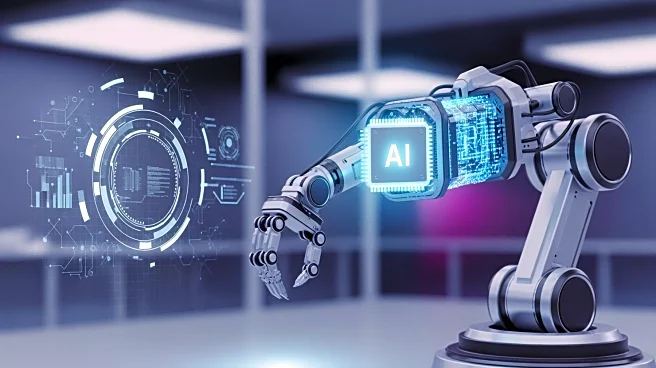What's Happening?
Rivian has announced the creation of Mind Robotics, its second spin-off this year, focusing on the integration of artificial intelligence with robotics in manufacturing. According to Rivian's quarterly letter, Mind Robotics aims to harness industrial
AI to transform operations in the physical world, utilizing Rivian's data to create a data loop in robotics. The company has raised approximately $110 million in external seed funding for this initiative. The trademark application for Mind Robotics was filed with the U.S. Patent and Trademark Office, with Eclipse partner Jiten Belha as the signatory. The launch follows Rivian's earlier spin-off of a micro-mobility initiative into Also Inc. in March.
Why It's Important?
The establishment of Mind Robotics highlights the growing interest in robotics and industrial AI, particularly in sectors like manufacturing, logistics, and data management. This move by Rivian could lead to significant advancements in how industrial operations are conducted, potentially increasing efficiency and innovation. The spin-off may also influence other companies in the transportation technology space to explore similar integrations of AI and robotics. Rivian's focus on expanding its technological capabilities through spin-offs could position it as a leader in industrial AI applications, impacting various sectors and potentially leading to new business opportunities.
What's Next?
Rivian has promised further updates on Mind Robotics, although specific details remain limited. The company has not commented on the potential transfer of Rivian employees to Mind Robotics, but materials suggest such a scenario could occur. As the spin-off develops, stakeholders will likely watch for how Rivian manages personnel transitions and integrates AI into its operations. The broader industry may also monitor Mind Robotics' progress to assess its impact on manufacturing and logistics sectors.
Beyond the Headlines
The launch of Mind Robotics could have deeper implications for the ethical and cultural dimensions of AI integration in manufacturing. As AI becomes more prevalent in industrial settings, questions about job displacement and the ethical use of AI in decision-making processes may arise. Additionally, the success of Mind Robotics could influence long-term shifts in how companies approach innovation and technology development, potentially setting new standards for AI applications in industry.















